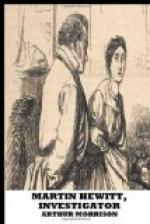It was an evening paper of the previous Thursday, and the paragraph was a very short one, thus:
“The man Wilks, who was arrested at Euston Station yesterday, in connection with the robbery of Lady Quinton’s jewels, has been released, nothing being found to incriminate him.”
“How does that strike you?” asked Hewitt. “Wilks is a man well known to the police—one of the most accomplished burglars in this country, in fact. I have had no dealings with him as yet, but I found means, some time ago, to add his portrait to my little collection, in case I might want it, and to-day it has been quite useful.”
The thing was plain now. Wilks must have been bringing his booty to town, and calculated on getting out at Chalk Farm and thus eluding the watch which he doubtless felt pretty sure would be kept (by telegraphic instruction) at Euston for suspicious characters arriving from the direction of Radcot. His transaction with Leamy was his only possible expedient to save himself from being hopelessly taken with the swag in his possession. The paragraph told me why Leamy had waited in vain for “Mr. W.” in the cab.
“What shall you do now?” I asked.
“I shall go to the Gold Street house and find out what I can as soon as this cab turns up.”
There seemed a possibility of some excitement in the adventure, so I asked: “Will you want any help?”
Hewitt smiled. “I think I can get through it alone,” he said.
“Then may I come to look on?” I said. “Of course I don’t want to be in your way, and the result of the business, whatever it is, will be to your credit alone. But I am curious.”
“Come, then, by all means. The cab will be a four-wheeler, and there will be plenty of room.”
* * * * *
Gold Street was a short street of private houses of very fair size and of a half-vanished pretension to gentility. We drove slowly through, and Leamy had no difficulty in pointing out the house wherein he had been paid five pounds for carrying a bag. At the end the cab turned the corner and stopped, while Hewitt wrote a short note to an official of Scotland Yard.
“Take this note,” he instructed Leamy, “to Scotland Yard in the cab, and then go home. I will pay the cabman now.”
“I will, sor. An’ will I be protected?”
“Oh, yes! Stay at home for the rest of the day, and I expect you’ll be left alone in future. Perhaps I shall have something to tell you in a day or two; if I do, I’ll send. Good-by.”
The cab rolled off, and Hewitt and I strolled back along Gold Street. “I think,” Hewitt said, “we will drop in on Mr. Hollams for a few minutes while we can. In a few hours I expect the police will have him, and his house, too, if they attend promptly to my note.”
“Have you ever seen him?”
“Not to my knowledge, though I may know him by some other name. Wilks I know by sight, though he doesn’t know me.”




